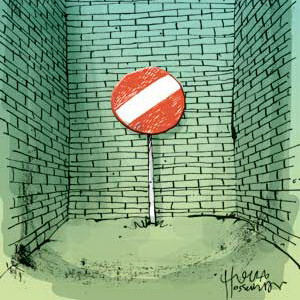Don’t Tie Hopes to Targeted Sanctions

“It is clear that there is a relatively small group of decision-makers inside Iran. They are in both political and commercial relationships, and if we can create a sanctions track that targets those who actually make the decisions, we think that is a smarter way to do sanctions”.
Hillary Clinton, 13th of January 2010, on her flight to Hawaii.
But can ‘targeted’ sanctions change Iran’s policies?
Rahman Qahremanpour, head of the Expediency Council Disarmament Committee and foreign affairs analyst:
It is not clear what Hillary Clinton means by ‘targeted sanctions’ is different. Anyway, such purposeful sanctions were imposed against Iraq in the early 1990s after it invaded neighboring Kuwait and fired rockets towards Israel. The strong impact of those sanctions brought many to the belief that they are powerful and effective.
These days, we hear much about Five plus One negotiations and a likely decision to use targeted sanctions against Iran. That such discussions have been held proves that previous sanctions against Iran have been futile despite West’s expectations. Let’s focus more on the phrase used by Hillary Clinton, ‘targeted sanctions’. If by this term she means introducing restrictions on Iranian officials and some certain organizations, there is no innovation in her proposal since such objectives were intended in the first three resolutions issued by UN Security Council against Iran. Each resolution just added a number of names to the list of boycotted figures and institutions. The so-called purposeful sanctions are an old story if they are going to continue that trend, unless Hillary Clinton has key Iranian politicians in mind when she talks of those sanctions. Her yesterday remarks provide no chances for interpretation.
But why is the United States talking about meaningful sanctions at this point of time? One reason may be the difficulties of convincing other members of the group, particularly Russia and China, to agree with the gasoline embargo and other similar plans. By drawing forth purposeful sanctions which target a limited number of Iranian statesmen and organization, the United States and EU are probably trying to persuade Russia and China to join West in UN Security Council. The European Union and U.S. have just forgotten one important point: why are they looking after targeted sanctions when the preceding cases have proved unsuccessful?
And the inherent paradox: Iranians are not detached from their leaders. Any sanction that targets senior Iranian statesmen has in fact targeted the Iranian nation.

